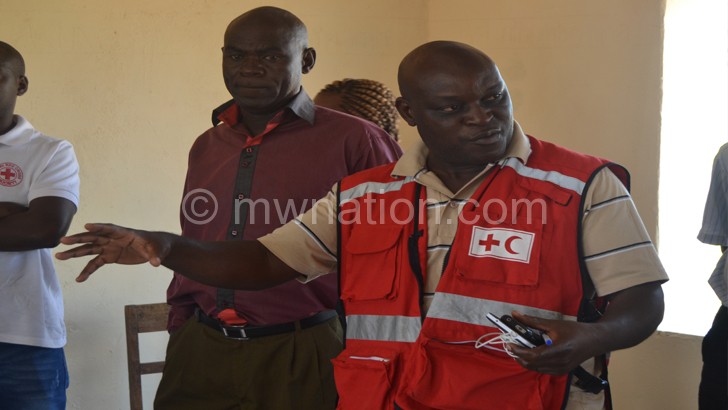Rising from a troubled past
Hundreds of underprivileged children are breaking the mould for better, thanks to Red Cross. JAMES CHAVULA writes.
Society tagged her mwana wamuthondo, ‘a child of the bush’. However, the ambitious ‘girl without a father’ has not been written off yet.

“At 19, I’ve never seen my father,” Chawezi Nyirenda smiles assertively. “He reportedly escaped to Blantyre having dumped mom shortly after impregnating her. That was the end of her education, the beginning of our desperation.”
Interestingly, the forsaken rural girl in Chilumba, Karonga, is steadily turning her troubled past into a springboard to a bright future—spiritedly surmounting an array of hardships facing numerous children rejected by their fathers when it mattered most.
Once a laughing stock in her village, Chawezi, raised by her mother and relatives, has had to endure frequent evictions from Karonga Girls Secondary School as her guardians could not afford fees.

But she weeps no more.
A stone a builder refused has become a cornerstone as she is smiling all the way to university. Presently, Chawezi is in the frame to pursue a Bachelor of Social Science degree in Gender Studies at the University of Malawi’s Chancellor College (Chanco) starting next year.
“Life has not been easy, but my mother’s dilemma was a life-changing lesson: born of an unwanted pregnancy, I did not want to fall into the pit that ended mom’s hopes,” she says.
As the sorry start builds up to a stirring climax, she says setting her foot in the university corridors is no end of the beginning or the beginning of the end.
“The journey continues,” she says of the feat which has made her talk of girls in and outside Mtoweranyifwa, a lakeside village in Sangiro, TA Wasambo.
Not only is Chawezi a beacon of hope in the village whose name screams: What good can come from our midst if not funerals?
She is a brimming human face of how empowering partnerships transform lives of orphaned and vulnerable children.
In the village, her mother Tabulalika Nyirenda vividly remembers the day Malawi Red Cross Society programme manager Elliot Nazose visited her homestead, asking: “Where is Chawezi?”
Nazose remembers the mother, who had just emerged from a cassava garden with a long hoe on her shoulder, was more tearful than tongue-tongued when they first met.
The community worker narrated: “She dejectedly said: ‘the girl is at Karonga Girls, but she will be back shortly to collect fees. I can’t figure out where the money will come from.”
The teary tale transitioned into profound joy when Nazose told her that Red Cross would start paying fees for Chawezi. The next day, the two were on the road to Karonga Girls where the overcomer was admittedly ‘like a beggar’ and ‘with low self-esteem’ as she relied on schoolmates for soap as well as a return bus ticket.
Narrated Nazose: “The woman danced with joy, singing and ululating, but that was nothing like Chawezi’s reaction when I revealed that Red Cross was ready to support her education.
“She said: I’ll go to university.’ She just wanted a chance and it is pleasing seeing her repressed dream finally come true.”
That day, in 2003, the then Form Three student joined nearly 300 secondary school learners and 600 pupils who get fees, soap, books and sanitary pads cash-rolled by the Danish Red Cross Society. Thirty of them have been trained in vocational skills, including tailoring and carpentry. All of them selected by a network of 96 community-based facilitators in 48 villages.
During the meeting in August, Chawezi was directing events at this girl group camp at Chilumba Secondary School. Working closely with teachers and prominent female role models to ensure girls resist risky sexual behaviour and stay longer in school, she told her in school peers: “Love school with all your hearts, because men’s loves will only leave you with unwanted heartbreaks, infections and pregnancy.”
The learners, belonging to 24 girl groups in six secondary school with 40 teachers trained as mentors for girls, call the summer recess camps a safe space for behavioural change lessons at a time the youthful age group is exposed to HIV and AIDS.
“We freely debate several issues about us, how we can go on with school and our sexuality that most parents seldom discuss with their children,” says Latifah Mwausegha, 17, who left Chilumba Secondary School last year.
Likewise, district youth officer Kondwani Newa credits the Red Cross Intervention for reducing the number of boys and girls dropping out of school amid a worrisome tide of child marriages, teen pregnancy, youth unemployment and HIV infections.
“The allure of money and highlife often flush the youth out of school in Karonga, but girls face a higher risk as they tend to have their sex debut aged just 10,” Newa said.
In his words, high money circulation in the shoreline border district lifestyle—a confluence of sex workers, cross-border traders, long-distance transporters, tourists, farmers and fishing communities—increasingly exposes girls to sexually transmitted infection, including HIV.
Tightening the noose around school-going girls’ necks are traditional practices which allow parents marry off children in exchange for cows or to guarantee loans.
Nearly 10 in 100 Karonga residents are living with the virus which causes Aids. The figure could be slightly lower than the national average of 10.6 percent, but it remains the second highest in the Northern Region where Nkhata Bay is the worst hit.
As the journey continues, Chawezi is grateful that the Red Cross intervention conjured up to eliminate gender disparities and restore girls confidence in poor households has helped her break the mould.
Thanking the voluntary aid society that alleviates human suffering in crisis zones, she says: “My future looks so bright it’s up to me to make it happen.





